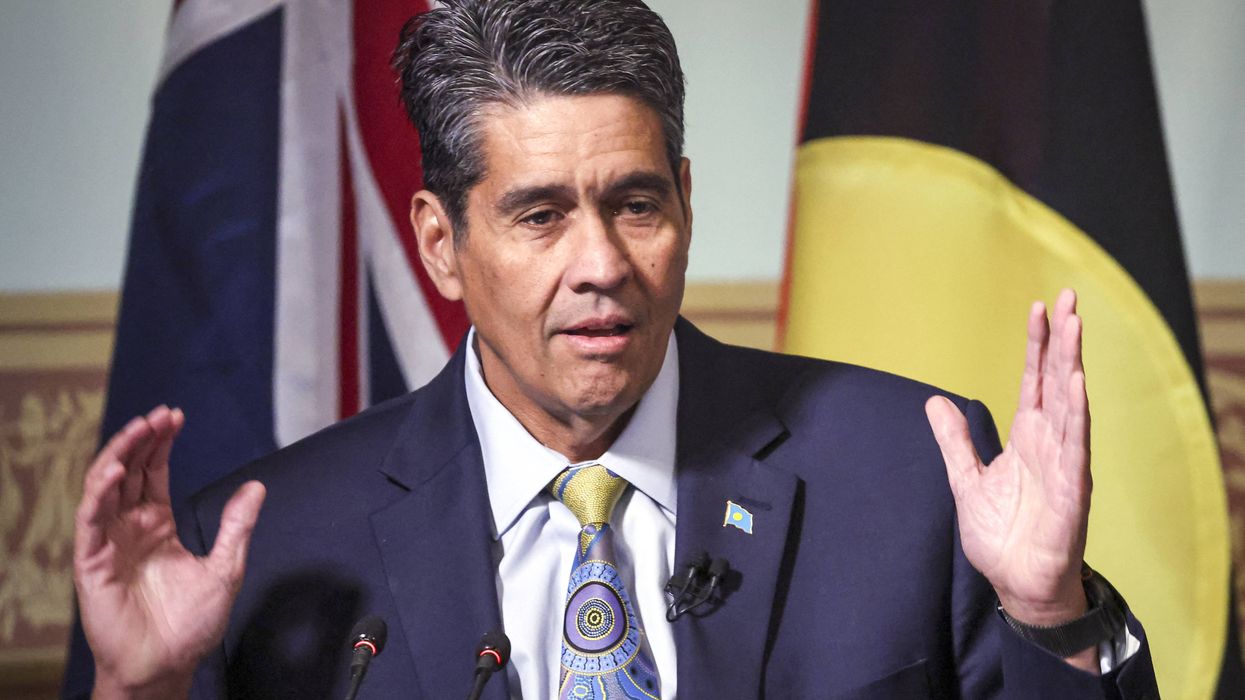January, 27 2016, 12:15pm EDT

World Report 2016: 'Politics of Fear' Threatens Rights
Terror Attacks, Refugee Crisis, and Broad Global Crackdown
ISTANBUL
The politics of fear led governments around the globe to roll back human rights during 2015.
In the 659-page World Report 2016, its 26th edition, Human Rights Watch reviews human rights practices in more than 90 countries. In his introductory essay, Executive Director Kenneth Roth writes that the spread of terrorist attacks beyond the Middle East and the huge flows of refugees spawned by repression and conflict led many governments to curtail rights in misguided efforts to protect their security. At the same time, authoritarian governments throughout the world, fearful of peaceful dissent that is often magnified by social media, embarked on the most intense crackdown on independent groups in recent times.
"Fear of terrorist attacks and mass refugee flows are driving many Western governments to roll back human rights protections," Roth said. "These backward steps threaten the rights of all without any demonstrated effectiveness in protecting ordinary people."
Significant refugee flows to Europe, spurred largely by the Syrian conflict, coupled with broadening attacks on civilians in the name of the extremist group Islamic State (also known as ISIS), have led to growing fear-mongering and Islamophobia, Human Rights Watch said. But as European governments close borders, they are reviving old patterns of shirking responsibility for refugees by passing the problem to countries on Europe's periphery that are less equipped to house or protect refugees. The emphasis on the potential threat posed by refugees is also distracting European governments from addressing their homegrown terrorist threats and the steps needed to avoid social marginalization of disaffected populations.
Policymakers in the United States have used the terrorism threat to try to reverse recent modest restrictions on intelligence agencies' ability to engage in mass surveillance, while the United Kingdom and France have sought to expand monitoring powers. That would significantly undermine privacy rights without any demonstrated increase in the ability to curb terrorism. Indeed, in a number of recent attacks in Europe, the perpetrators were known to law enforcement authorities, but the police were too overwhelmed to follow up, suggesting that what's needed is not more mass data but more capacity to pursue targeted leads, Human Rights Watch said.
"The tarring of entire immigrant or minority communities, wrong in itself, is also dangerous," Roth said. "Vilifying whole communities for the actions of a few generates precisely the kind of division and animosity that terrorist recruiters love to exploit."
Europe's response to the influx of refugees has also been counterproductive. The effect of leaving most asylum seekers little choice but to risk their lives on rickety boats at sea to reach Europe has created a chaotic situation that would-be terrorists can easily exploit.
"Creating a safe and orderly way for refugees to make their way to Europe would reduce lives lost at sea while helping immigration officials to screen out security risks, increasing security for everyone," Roth said.
Popular movements launched by civil society organizations with the aid of social media left many authoritarian governments running scared. The precedents of the Arab uprisings, Hong Kong's "umbrella protests," and Ukraine's Maidan movement sparked a determination among many autocrats to prevent people from banding together to make their voices heard.
Abusive governments have tried to smother civic groups by enacting laws that restrict their activities and cut off their needed international funding. Russia and China are among the worst offenders. Repression of this intensity - including shuttering critical groups in Russia and arresting rights lawyers and activists in China - has not been seen in decades, Human Rights Watch said. Turkey's ruling party has presided over an intense crackdown, targeting activists and media critical of the government.
Ethiopia and India, often using nationalistic rhetoric, have restricted foreign funding to fend off independent monitoring of government rights violations. Bolivia, Cambodia, Ecuador, Egypt, Kazakhstan, Kenya, Morocco, Sudan, and Venezuela have enacted vague and overly broad laws to rein in activists and undermine independent groups' ability to operate. Western governments have been slow to speak out against these global threats.
Despite these enormous threats to rights, 2015 also brought positive developments. Lesbian, gay, bisexual, and transgender (LGBT) people, who are often subject to abusive laws and violent attacks, made great strides towards equality with the legalization of same-sex marriage in Ireland, Mexico, and the US, and the decriminalization of homosexuality in Mozambique. At the United Nations Human Rights Council, a statement by 72 countries affirmed a commitment to end violence and discrimination based on sexual orientation and gender identity.
Landmark elections in Burma passed off peacefully in November, and Nigerians also celebrated the peaceful transfer of power to the opposition. In September, the UN adopted 17 ambitious development goals that for the first time are universal and grounded in human rights; they include goals to achieve gender equality and to provide access to justice for all. At the UN climate summit in Paris, governments agreed for the first time to "respect, promote and consider" human rights in their response to climate change, especially with regards to indigenous people, women, children, migrants, and others in vulnerable situations.
The failure of punitive approaches to drug use has prompted increased dialogue and steps towards decriminalization in many places, including Canada, Chile, Croatia, Colombia, Jamaica, Jordan, Ireland, Tunisia, and the US. And victims cheered the trial of Hissene Habre, the former Chad dictator prosecuted in Senegal for crimes against humanity during his rule in the 1980s - the first trial of a former head of state by the courts of another country.
"The wisdom enshrined in international human rights law provides indispensable guidance to governments that seek to keep their nation safe and serve their people most effectively," Roth said. "We abandon it at our peril."
Human Rights Watch is one of the world's leading independent organizations dedicated to defending and protecting human rights. By focusing international attention where human rights are violated, we give voice to the oppressed and hold oppressors accountable for their crimes. Our rigorous, objective investigations and strategic, targeted advocacy build intense pressure for action and raise the cost of human rights abuse. For 30 years, Human Rights Watch has worked tenaciously to lay the legal and moral groundwork for deep-rooted change and has fought to bring greater justice and security to people around the world.
LATEST NEWS
'Unhinged' Trump Wishes 'Merry Christmas to All, Including the Radical Left Scum'
"Nothing more Christian than to be a hateful wretched fuck on Jesus’ birthday," quipped one critic.
Dec 25, 2025
In a message called typically on-brand by observers, US President Donald Trump wished "Merry Christmas to all"—including his political opponents, whom he described in decidedly unchristlike language.
"Merry Christmas to all, including the Radical Left Scum that is doing everything possible to destroy our Country, but are failing badly," Trump said Christmas Eve on his Truth Social network.
"We no longer have Open Borders, Men in Women’s Sports, Transgender for Everyone, or Weak Law Enforcement," the president added. "What we do have is a Record Stock Market and 401K’s, Lowest Crime numbers in decades, No Inflation, and yesterday, a 4.3 GDP, two points better than expected. Tariffs have given us Trillions of Dollars in Growth and Prosperity, and the strongest National Security we have ever had. We are respected again, perhaps like never before. God Bless America!!!"
While nothing new—Trump has used past Christmas messages to tell people he doesn't like to "go to hell" and "rot in hell"—observers, including some MAGA supporters, were still left shaking their heads.
"Radical Left Scum" 😂🤣😂🤣😂🤣Christmas greetings from a liar, traitor, pedophile, and overall shitstain upon society.
[image or embed]
— Bill Madden (@maddenifico.bsky.social) December 24, 2025 at 9:00 PM
"Nothing more Christian than to be a hateful wretched fuck on Jesus’ birthday!" liberal political commentator Dean Withers said on X.
Another popular X account posted: "A sitting president of the United States using Christmas Day to spew venom at fellow Americans he calls 'Radical Left Scum' isn’t just unpresidential—it’s unhinged, un-Christian, and utterly beneath the office."
"This is the behavior of a bitter, small man who can’t even pretend to unify for one holy day," she added. "Shameful. Disgraceful. Pathetic."
Keep ReadingShow Less
Palau Signs Controversial $7.5 Million Deal to Take 75 Trump Deportees
"What if we spent the $100,000 per person in America setting them up with housing assistance, healthcare, education, etc?" asked one critic.
Dec 25, 2025
Palau said Wednesday that it has agreed to take in up to 75 people deported from the United States during President Donald Trump's purge of unauthorized immigrants in exchange for millions of dollars in financial assistance—a move that has sparked considerable opposition among the Pacific archipelago nation's roughly 18,000 inhabitants.
The office of Palauan President Surangel Whipps Jr. announced a memorandum of understanding with the United States under which the country will receive $7.5 million in assistance in exchange for taking in 75 third-country deportees who cannot be repatriated to their countries of origin.
Earlier this week, US State Department Principal Deputy Spokesperson Tommy Pigott said the people who will be sent to Palau have “no known criminal histories," as is the case with the vast majority of unauthorized immigrants in the United States, who have committed no crime other than the mere misdemeanor of entering the country illegally.
However, Palauans have voiced concerns over US Secretary of State Marco Rubio's remarks during a Cabinet meeting earlier this year in which he said that, “We want to send some of the most despicable human beings—perverts, pedophiles, and child rapists—to your countries as a favor to us."
Whipps said Wednesday that the relocation plan involves “people seeking safety and stability."
“These are not criminals,” the president said during earlier debate on the proposal. “Their only offense was entering the United States illegally and working without proper permits.”
However, Palau's Congress and its influential Council of Chiefs have twice rejected the transfers.
Piggot's statement "highlighted US commitments to partner with Palau on strengthening the country’s healthcare infrastructure, increasing Palau’s capacity to combat transnational crime and drug trafficking, and bolstering Palau’s civil service pension system."
Palau, which was administered by the US from 1947-94 and is now associated with the United States under the 1994 Compact of Free Association, which guaranteed the country nearly $900 million economic aid over 20 years in exchange for exclusive US military access.
The country's foreign policy often tracks closely to that of the US. For example, Palau is sometimes among the handful of usually similarly small nations that vote along with the United States and Israel against United Nations resolutions condemning Israeli crimes or affirming Palestinian rights.
Other developing nations including Eswatini, Rwanda, South Sudan, and Uganda have also agreed to take in US deportees or are considering doing so.
Reactions to the US-Palau agreement drew criticism on social media, where one X user called the deal a "bribe" and another popular Bluesky account asked, "What if we spent the $100,000 per person in America setting them up with housing assistance, healthcare, education, etc?"
Keep ReadingShow Less
Trump 'Choosing From the War Crimes Menu' With 'Quarantine' on Venezuela Oil Exports
"Economic strangulation is warfare and civilians always pay the price," lamented CodePink.
Dec 25, 2025
President Donald Trump has ordered US military forces to further escalate their aggression against Venezuela by enforcing a "quarantine" on the South American nation's oil—by far its main export—in what one peace group called an attempted act of "economic strangulation."
"While military options still exist, the focus is to first use economic pressure by enforcing sanctions to reach the outcome the White House is looking [for]," a US official, who spoke on condition of anonymity, told Reuters.
The move follows the deployment of an armada of US warships and thousands of troops to the region, threats to invade Venezuela, oil tanker seizures off the Venezuelan coast, Trump's authorization of covert CIA action against the socialist government of Venezuelan President Nicolás Maduro, and airstrikes against boats allegedly running drugs in the Caribbean Sea and Pacific Ocean that have killed more than 100 people in what critics say are murders and likely war crimes.
This, atop existing economic sanctions that experts say have killed tens of thousands of Venezuelans since they were first imposed during the first Trump administration in 2017.
"The efforts so far have put tremendous pressure on Maduro, and the belief is that by late January, Venezuela will be facing an economic calamity unless it agrees to make significant concessions to the US," the official told Reuters.
The official's use of the word "quarantine" evoked the 1962 Cuban Missile Crisis, an existential standoff that occurred after the John F. Kennedy administration imposed a naval blockade around Cuba to prevent Soviet nuclear missiles from being deployed on the island, even as the US was surrounding the Soviet Union with nuclear weapons.
"This is an illegal blockade," the women-led peace group CodePink said in response to the Reuters report. "Calling it a 'quarantine' doesn’t change the reality. The US regime is using hunger as a weapon of war to force regime change in Venezuela. Economic strangulation is warfare and civilians always pay the price. The US is a regime of terror."
Critics have also compared Trump's aggression to the George W. Bush administration's buildup to the invasion and occupation of Iraq, initially referred to as Operation Iraqi Liberation (OIL). But unlike Bush, Trump—who derided Bush for not seizing Iraq's petroleum resources as spoils of war—has openly acknowledged his desire to take Venezuela's oil.
"Maybe we will sell it, maybe we will keep it,” he Trump said on Monday. “Maybe we’ll use it in the strategic reserves. We’re keeping the ships also.”
On Wednesday, a panel of United Nations experts said that the US blockade and boat strikes constitute "illegal armed aggression" against Venezuela.
Multiple efforts by US lawmakers—mostly Democrats, but also a handful of anti-war Republicans—to pass a war powers resolution blocking the Trump administration from bombing boats or attacking Venezuela have failed.
The blockade and vessel seizures have paralyzed Venezuela's oil exports. Ports are clogged with full tankers whose operators are fearful of entering international waters. Venezuela-bound tankers have also turned back for fear of seizure. Although Venezuelan military vessels are accompanying tankers, the escorts stop once the ships reach international waters.
According to the New York Times, Venezuela is considering putting armed troops aboard tankers bound for China, which, along with Russia, has pledged its support—but little more—for Caracas.
Keep ReadingShow Less
Most Popular


